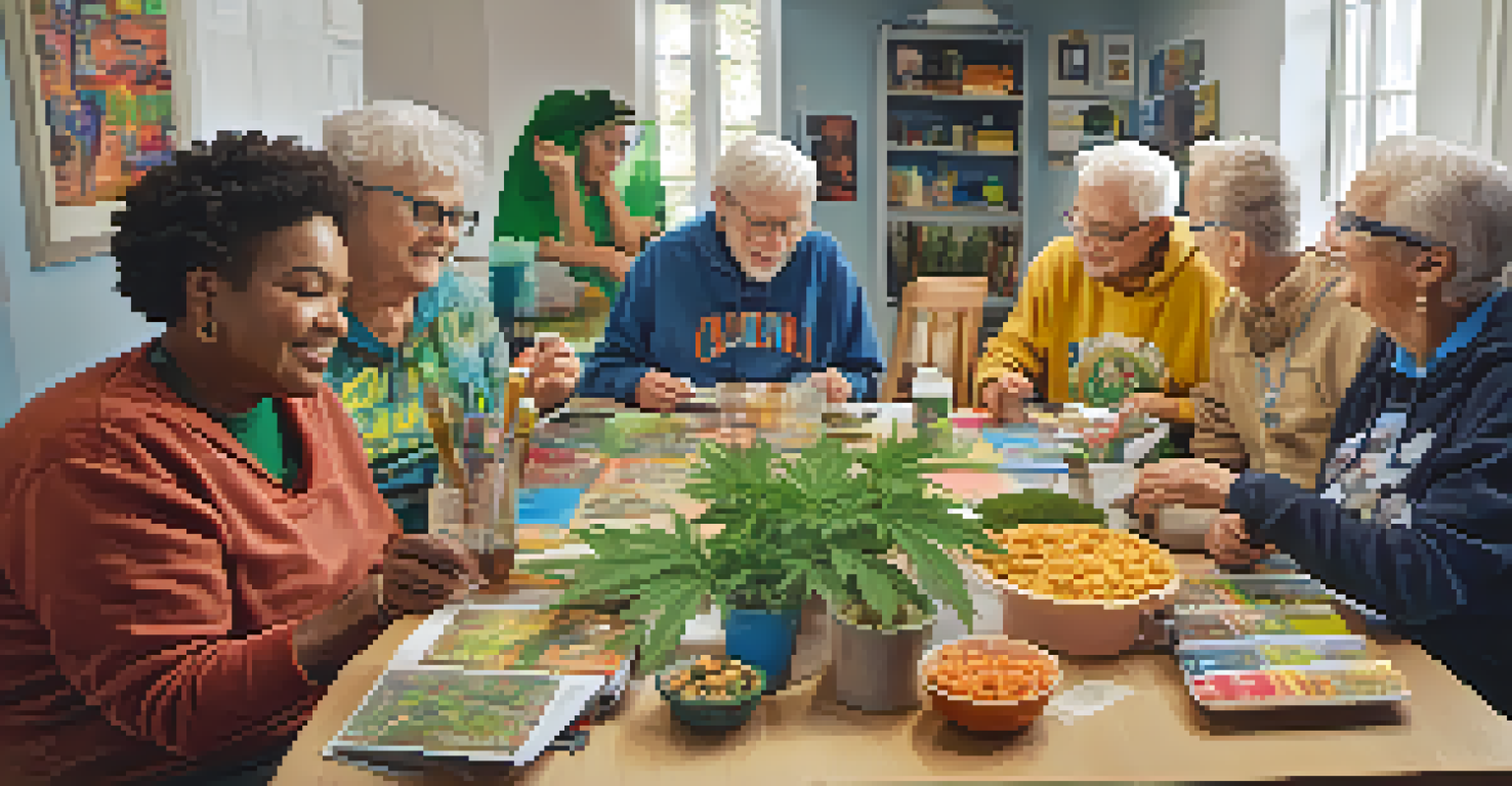Understanding Marijuana's Impact on the Aging Population

The Growing Interest in Marijuana Among Seniors
In recent years, more seniors have shown interest in marijuana, often seeking relief from chronic pain, anxiety, and sleep disorders. This shift is partly due to changing perceptions around cannabis, as many now see it as a natural alternative to traditional medications. With growing legalization, older adults feel more empowered to explore cannabis options in their health routines.
Cannabis is a substance that can create a bridge between generations, allowing families to discuss health and wellness in a new light.
However, this newfound interest comes with its own set of challenges. Many seniors may not be familiar with how to use marijuana safely or effectively. Education around proper dosages, methods of consumption, and potential side effects is crucial to ensure they can make informed decisions.
Moreover, anecdotal evidence suggests that seniors who use marijuana report improved quality of life, including better mood and enhanced social interactions. As more studies emerge, the conversation around cannabis and aging continues to evolve, highlighting the need for ongoing research.
Understanding Medical Benefits of Marijuana for Seniors
Research suggests that marijuana may offer various medical benefits for older adults, particularly in managing pain and inflammation. Cannabinoids, the active compounds in cannabis, have been shown to interact with the body’s endocannabinoid system, which plays a role in regulating pain and immune responses. This means that for seniors dealing with arthritis or other chronic conditions, marijuana could provide a more natural relief option.

Beyond pain management, marijuana may also help alleviate symptoms of anxiety and depression, common issues among the aging population. Many seniors report feeling more relaxed and socially engaged after using cannabis, which can combat feelings of loneliness or isolation. This psychological uplift can be incredibly beneficial in enhancing overall well-being.
Seniors Seek Relief Through Cannabis
Many older adults are turning to marijuana as a natural alternative for managing chronic pain, anxiety, and sleep disorders.
Furthermore, studies have indicated that marijuana can improve sleep quality, an area many seniors struggle with. By promoting better sleep, cannabis not only helps with rest but can also lead to improved cognitive function and daily energy levels.
Potential Risks of Marijuana Use for Older Adults
While marijuana offers potential benefits, it's essential to recognize the risks, especially for seniors. The aging process can affect how the body metabolizes substances, potentially leading to heightened sensitivity to THC, the psychoactive component of cannabis. This can increase the risk of side effects such as dizziness, confusion, or impaired motor skills.
The greatest danger of marijuana is its reputation as a safe and harmless drug, which can lead to misuse and underestimation of its effects.
Moreover, older adults often take multiple medications, raising concerns about drug interactions. It's crucial for seniors to consult with healthcare providers before incorporating marijuana into their routines to ensure it won't interfere with existing treatments. This proactive approach can help mitigate any potential health risks.
Additionally, the method of consumption matters. Smoking may not be the healthiest option for seniors with respiratory issues, prompting the need for alternative delivery methods, such as edibles or oils. Understanding these nuances is vital for safe and effective cannabis use.
The Role of Education and Resources
Education plays a pivotal role in helping seniors navigate the world of marijuana. Many older adults may not be familiar with the different strains, dosages, or consumption methods available. Providing accessible information can empower them to make informed choices about their health.
Community resources, such as workshops or support groups, can be incredibly beneficial. These platforms allow seniors to share experiences and learn from one another in a supportive environment. Additionally, healthcare professionals can play a key role in dispelling myths and providing reliable information about cannabis use.
Education is Key for Safe Use
Proper education on dosages, consumption methods, and potential side effects is crucial for seniors to use marijuana safely and effectively.
As more research is conducted and the conversation around marijuana evolves, it’s essential to keep seniors informed. This ongoing education ensures they can confidently incorporate cannabis into their wellness strategies, enhancing their quality of life.
Legal Considerations for Seniors Using Marijuana
Navigating the legal landscape of marijuana can be particularly daunting for seniors. Laws regarding cannabis use vary significantly by state and can often be confusing. Understanding local regulations is crucial for older adults who wish to explore marijuana as a treatment option.
In many regions, medical marijuana programs are available, which can provide a legal pathway for seniors to access cannabis. These programs typically require a recommendation from a healthcare provider, ensuring that patients have professional guidance throughout the process. This step can also help mitigate concerns surrounding legal repercussions.
It's also important for seniors to be aware of any restrictions regarding cannabis use in public spaces or housing communities. Being informed about these regulations can prevent any unintended legal issues, allowing seniors to enjoy the benefits of marijuana without worry.
Social Implications of Marijuana Use Among Seniors
The social landscape around cannabis is rapidly changing, and this shift is particularly notable among seniors. As more older adults embrace marijuana, it can lead to a breaking down of stigmas associated with its use. This change can foster open conversations about cannabis in social circles, encouraging others to explore its benefits.
For many seniors, using marijuana can enhance social interactions, making gatherings more enjoyable and less anxiety-inducing. This can lead to more vibrant social lives, promoting mental health and reducing feelings of isolation. In this way, cannabis use can be a catalyst for building stronger community ties.
Legal Understanding is Essential
Seniors must navigate varying state laws and understand local regulations regarding marijuana use to avoid legal issues while exploring its benefits.
Moreover, as family dynamics change, conversations about marijuana can create opportunities for connection between generations. Discussing its uses and effects openly can bridge gaps and foster understanding, allowing families to navigate this evolving topic together.
The Future of Marijuana Research and Aging
The future of marijuana research holds great promise, particularly as it relates to the aging population. As interest in cannabis grows, so does the need for more comprehensive studies to understand its long-term effects on seniors. Future research could uncover more benefits and inform guidelines that cater specifically to older adults.
Additionally, as regulations continue to evolve, researchers may gain better access to study cannabis in clinical settings. This could lead to more robust findings, ultimately enhancing the credibility of cannabis as a treatment option for various ailments in seniors. Such advancements may pave the way for more widespread acceptance in the medical community.

In conclusion, as we look forward to the future, ongoing dialogue and research will be vital. By prioritizing studies focused on elderly populations, we can ensure that marijuana is used safely and effectively to enhance the quality of life for seniors.